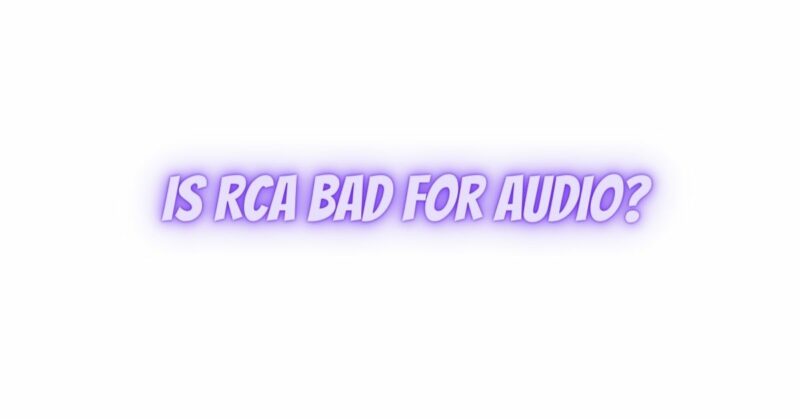RCA (Radio Corporation of America) cables, also known as phono cables, have been a staple in audio and video connections for many decades. They are widely used to transmit analog audio signals between various devices, including CD players, turntables, amplifiers, and speakers. However, questions often arise about whether RCA cables are suitable for high-quality audio applications. In this comprehensive article, we’ll delve into the pros and cons of RCA cables for audio and help you understand when they might be a good choice and when alternative connections may be preferred.
The Pros of RCA Cables for Audio
1. Simplicity and Ubiquity:
RCA cables are known for their simplicity. They are easy to use, with color-coded connectors (usually red for the right channel and white for the left channel) that make setup straightforward. Additionally, RCA connections are ubiquitous, making them compatible with a wide range of audio equipment.
2. Cost-Effective:
RCA cables are generally cost-effective and readily available. They provide a budget-friendly option for connecting audio components without breaking the bank.
3. Versatility:
RCA cables can transmit both line-level signals (common for CD players, DVD players, and other audio sources) and phono-level signals (common for turntables). This versatility allows them to be used with various audio sources.
4. Analog Warmth:
Some audiophiles appreciate the analog warmth and character that RCA cables can bring to audio playback. While digital connections offer pristine clarity, RCA cables may introduce a subtle coloration that some listeners find pleasing.
The Cons of RCA Cables for Audio
1. Limited Bandwidth:
RCA cables are primarily designed for analog audio, and their bandwidth is limited compared to digital connections like HDMI or optical cables. This limitation can affect the transmission of high-resolution audio formats.
2. Susceptibility to Interference:
RCA cables are unbalanced cables, which means they are more susceptible to electromagnetic interference (EMI) and radiofrequency interference (RFI). This susceptibility can result in noise, hum, or other unwanted artifacts in the audio signal.
3. Signal Degradation over Distance:
As RCA cable lengths increase, signal degradation becomes more pronounced. Longer cables may experience attenuation, leading to a loss of signal strength and audio quality, especially at higher frequencies.
4. Limited Surround Sound Support:
For modern home theater systems and multi-channel audio, RCA cables are not the preferred choice. They lack the necessary channels for true surround sound formats like Dolby Atmos or DTS:X.
5. Digital Audio Transmission:
For transmitting high-resolution digital audio, such as from a Blu-ray player to an AV receiver, digital connections like HDMI or optical cables are preferred. RCA cables cannot carry digital audio signals.
When to Use RCA Cables for Audio
RCA cables can be suitable for various audio applications when used thoughtfully:
- Analog Audio: For stereo audio setups, RCA cables can provide satisfactory audio quality. They are well-suited for connecting turntables, CD players, and amplifiers.
- Vintage Audio Equipment: If you have older audio equipment that relies on analog connections, RCA cables are a natural choice.
- Personal Listening: If you appreciate the analog warmth that RCA cables can impart to audio playback, they may be your preferred choice for personal listening enjoyment.
When to Consider Alternatives
There are situations where alternative audio connections may be more appropriate:
- Digital Audio: When transmitting high-resolution digital audio, use HDMI or optical cables to maintain signal integrity.
- Surround Sound: For home theater setups and multi-channel audio, consider audio-video (AV) receivers with HDMI connectivity for support of modern surround sound formats.
- Long Cable Runs: For longer cable runs that may suffer from signal degradation, explore balanced audio connections, which are less susceptible to interference.
Conclusion
RCA cables have their pros and cons when it comes to audio applications. While they offer simplicity, affordability, and a touch of analog warmth, they have limitations in terms of bandwidth, susceptibility to interference, and signal degradation over distance. It’s essential to consider your specific audio setup and requirements when deciding whether RCA cables are the right choice for your audio needs. In many cases, a balanced approach that combines RCA cables with other connection types may provide the best audio quality and versatility for your audio setup.


